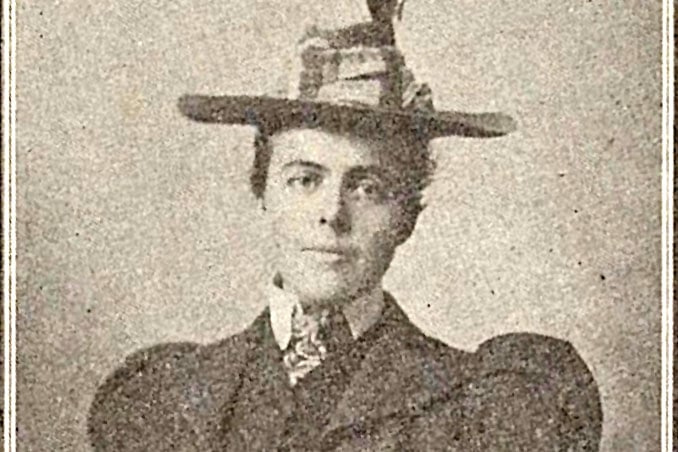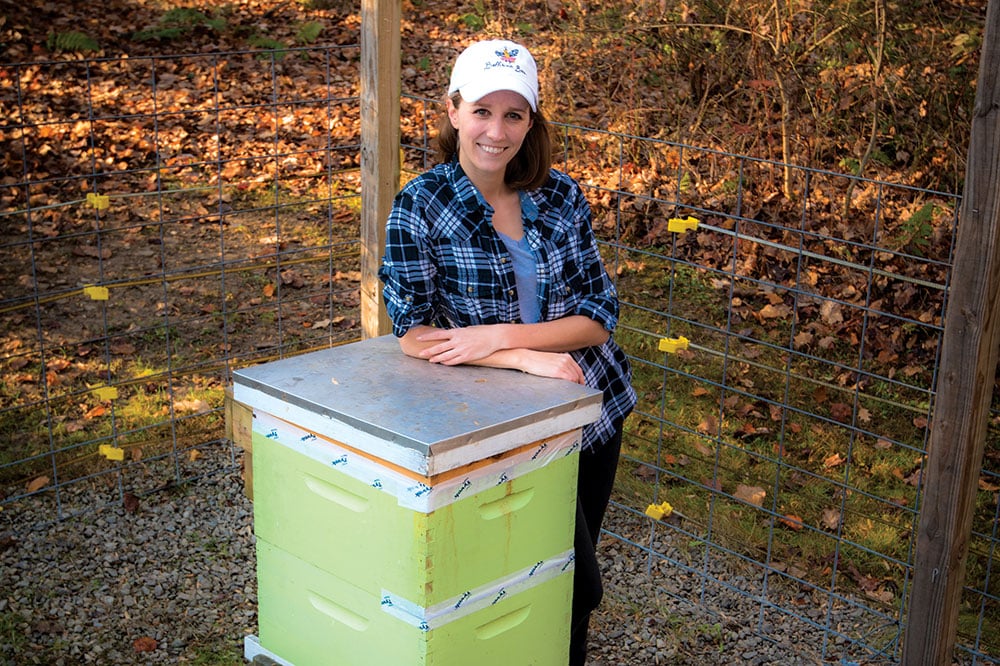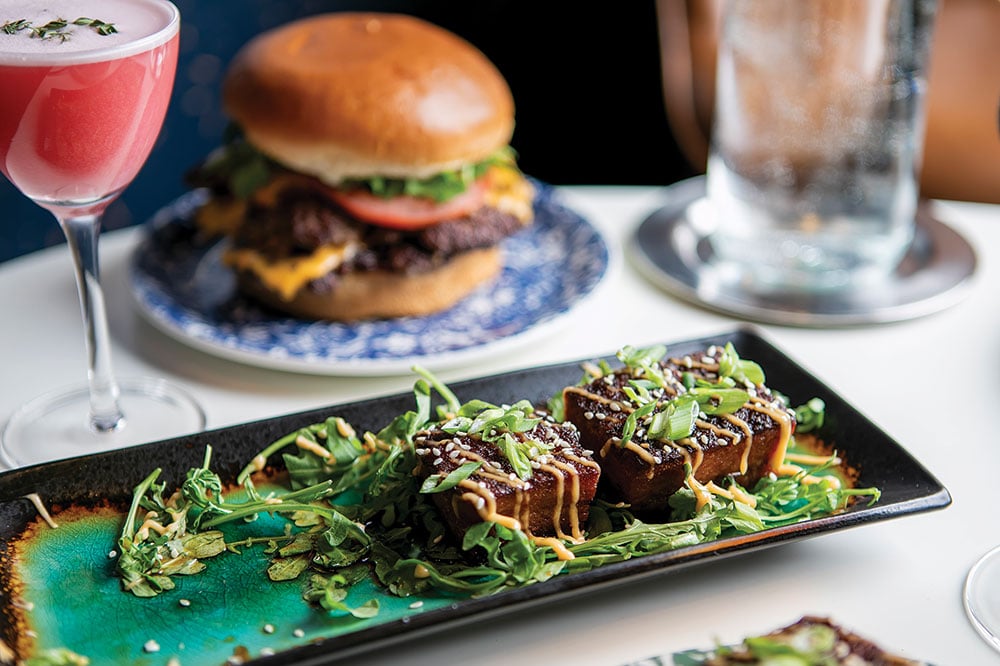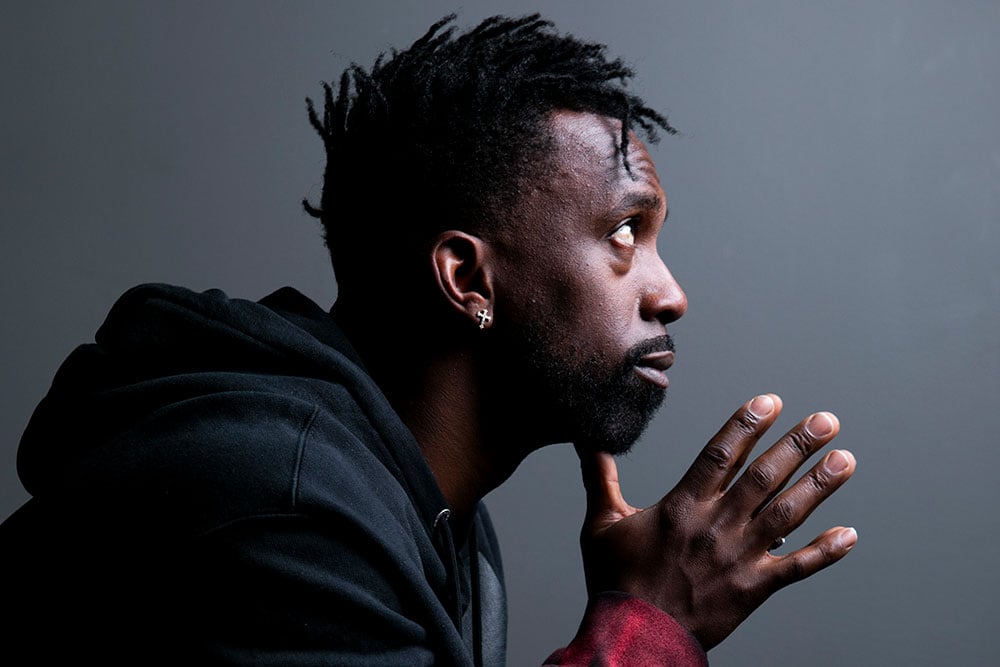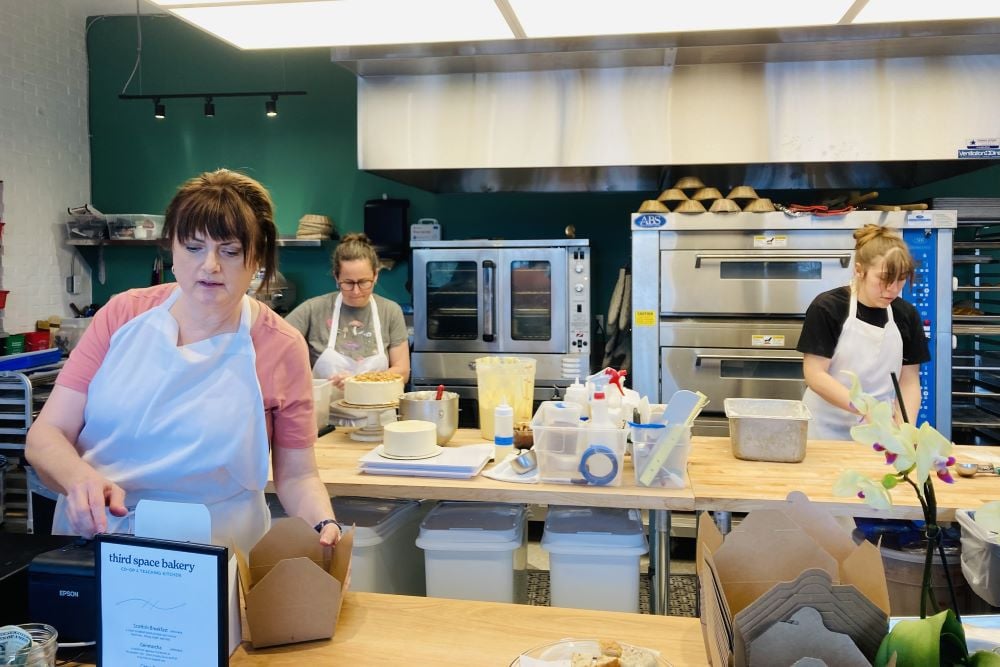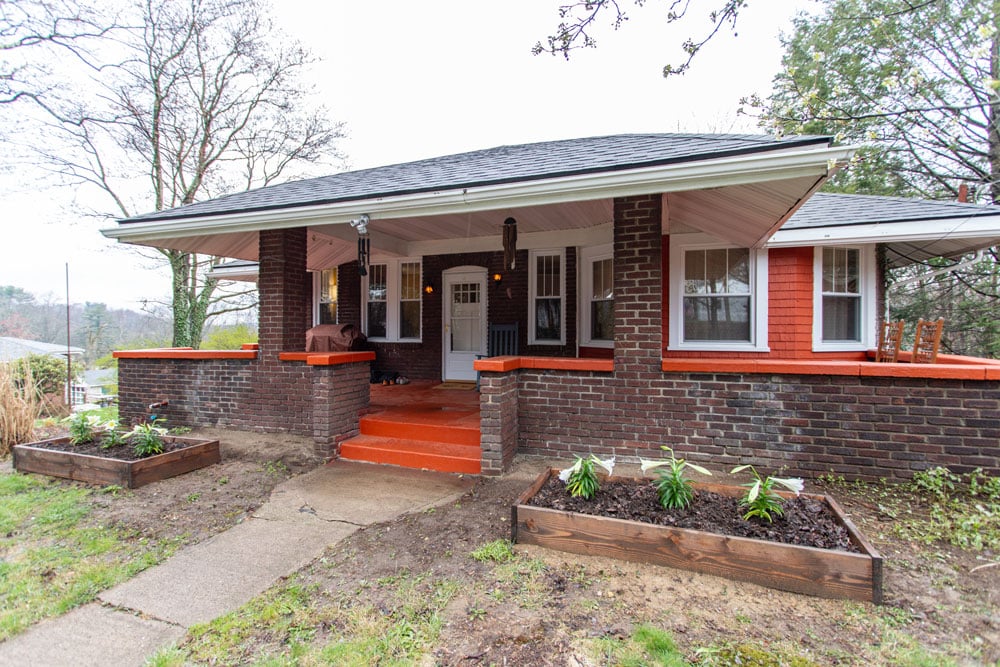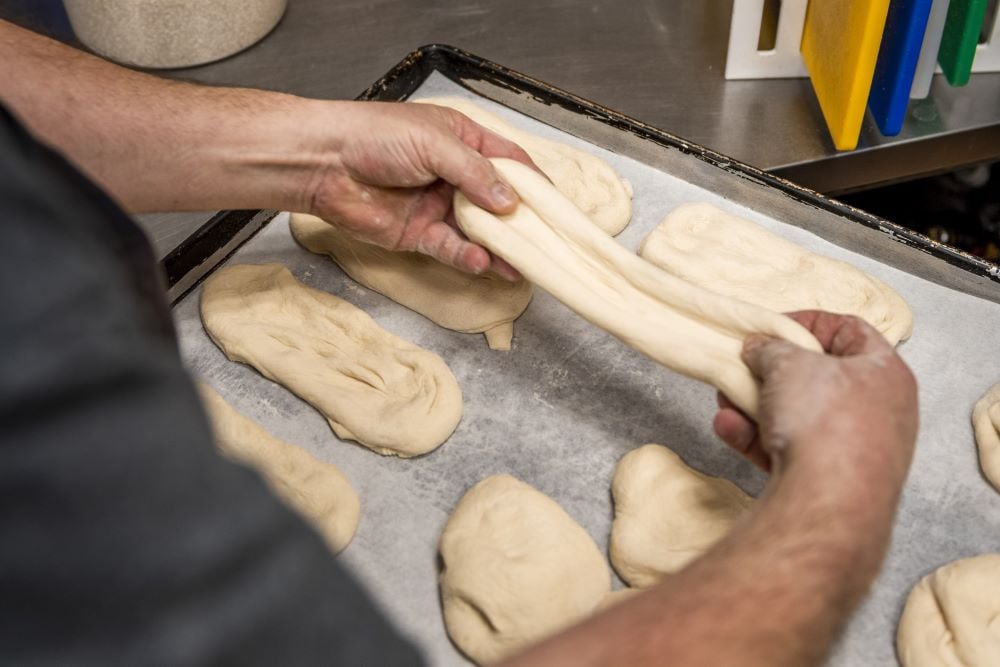A Visit Inside Pittsburgh’s Spiritual Village
In Pittsburgh, congregations of African immigrants are using worship to re-generate the kinship, identity, family life and culture found in their home countries.

HOUSEHOLD SERVICES OF THE PITTSBURGH INTERNATIONAL COMMUNITY CHURCH TAKE PLACE IN THE HOME OF PASTOR JOEL DUMBA, A NATIVE OF SOUTH SUDAN AND FOUNDER OF THE NONPROFIT AGAPE INTERNATIONAL.
Inside an old stone church on Pittsburgh’s western edge, the Sunday morning service is warming up. Together, worshippers in the House of Transformation Global Ministries lift up holy hands. Their prayers — in Lingala, a centuries-old Bantu language from central Africa — go up, too.
God must hear the two small boys at the front of the church as they pound on drums from the Congo, as well as the woman who shakes two gourds full of beans as she sways in the main aisle. “Yesu Kristu!” she shouts. “Jesus Christ!”
This is an immigrant African church in America. In mood and length, its service resembles the marathon Christian worship held in sweltering urban edifices or under airy thatch-roofed churches in the grasslands of rural sub-Saharan Africa. In those churches, services can last four hours or more.
The singing, the movement and the rhythms of African drums in this Pittsburgh church remind many of those in the pews of worship services in Zambia: spirit-filled and full of life. There is dancing, veneration at the altar, invocation of the saints — including the ancestors — and fellowship.
These churchgoers — strangers in a new land — find familiar African devotion practices inside this house of worship. And every Sunday, across the Pittsburgh area, at least eight immigrant African churches offer roughly 1,000 worshippers the opportunity to re-create the spiritual village they left behind.
For a few hours each week, they go home.
Transcendence
There are about 3,200 African immigrants and refugees who make their home in the Pittsburgh area, according to the Allegheny County Department of Human Services. They come from a host of nations, including Burundi, the Democratic Republic of the Congo, the Gambia, Nigeria, Somalia, Sudan, South Sudan and Liberia.
They are new arrivals — coming to escape wars, poverty or persecution — or they are voluntary immigrants drawn to America to seek economic and educational opportunities. They are nurses, teachers, entrepreneurs, janitors, maids, husbands, wives, sons, daughters, dancers and tailors.
As the worshippers gather, they invoke cultural poetics to render themselves visible. It is not uncommon for the congregants to introduce themselves by name and country of origin. “Hi, my name is Joe. I am from Uganda.” Or “Welcome, my name is Esther, and I am from Cameroon.”
They practice tradition and spark kinship that transcends ethnic and nationalistic boundaries. Here they pray, sing, cry, heal and build community. Pastors and ministry leadership are much like the village chiefs — leading, guiding and encouraging members through cultural transitions, material crises, life and death. When they gather and celebrate, these churchgoers share a fellowship that almost always features the foods of their homeland: lamb, greens, fufu (a doughy West African staple) and chicken dishes. They sing the music that they sang on the other side of the Atlantic.
“The worshippers feel at home here,” says Pastor Isaac Jere of the House of Transformation Global Ministries. “They don’t feel like an outsider. People feel less isolated. They feel attracted.”
Eric Beeko, a professor of Africana Studies at the University of Pittsburgh whose work has focused on African worship performances and culture, says that first-generation immigrant African worshippers tend to cluster for community, camaraderie and nurturing, in spite of their different nations of origin.
“They are bound together by being Diasporic — away from home, but looking for home,” he says. “They are communal, transcending class, ethnic and geographic distinctions to have a responsibility and aspiration to rise to help not only themselves, but the ones they left behind. And they seek to reconnect to their supernatural worldview — that God is integrated into everyday life and is directly responsible for healing, protecting and providing hope.”
Unity
At the House of Transformation Global Ministries, praises go up at about 9 a.m. Nearly four hours later, after congregants have danced for the Lord, belted out beautiful and hearty hymns, invoked the saints and prayed, the Sunday service in Pittsburgh’s West End isn’t complete. An altar call is still to come. The worshippers move to the front of the church, drop to their knees, hold hands and pray as they sing “Bind Us Together.” Jere, formerly a captain in Zambia’s military, is lead minister.
Jere was stationed in Kafue, an economically depressed town south of Lusaka, Zambia’s capital, when his faith grew stronger and he began evangelizing in the non-denominational Gospel Assembly Church. His passion was strong; he left active duty to minister full-time. He was soon sent to Botswana, more than 500 miles away, to pastor.
As a minister, every year Jere came to Des Moines, Iowa, for a congregational convention. In 2002, after the convention, he and his wife visited friends in Pittsburgh and decided to stay. U.S. immigration granted him religious worker status, and he moved to Florida to receive more spiritual training before returning to Pittsburgh and founding a church.
The ministry’s first home was a storefront on Route 51. In 2012, Jere moved into an aging, stone-built African Methodist Episcopal church in the West End. His ministry set out to embrace all people, he says. House of Transformation attracted native Pittsburghers but mostly embraced African Christians from Zambia, Ghana, Kenya, Rwanda and at least 10 other countries.
“There are many nations, but we are the same people. The [national] boundaries that mark our countries were drawn by someone who didn’t understand the people,” he says. “What we must know is that the village in Zambia is the same village in Malawi. While we may not be able to reconcile politically, we can be reconciled through the church, where we see each other as one. Here, in House of Transformation, we act out the unity that Africa — and the world — needs,” Jere adds.
Jere, a charismatic, talkative man who also works with his wife in real estate, is quick to remind his working-class congregation that it must “remain faithful and work so that God blesses the works of their hands,” and that these blessings can change both their lives and the life of the community.
That ethos is why the House of Transformation makes service its focus. Here, special attention is paid to securing immigrants’ legal rights, advancing their education and encouraging business and home ownership. Among the outreach efforts: providing scholarships, feeding families across the city, celebrating a community Thanksgiving dinner and hosting a spring ministry conference that draws participants from around the world.
“We want to lift people up, to encourage self-reliance,” Jere says. “We encourage people to own their own businesses and employ others. It is important for us that people live and not just exist.”
South Sudan native Pastor Joel Chrispo Dumba hosts twice-monthly, interdenominational services as part of his work with Agape International, a nonprofit he founded. Before COVID, these services would welcome a group of about 75 into a shared space at a United Methodist Church; due to financial setbacks related to the pandemic, the services are now given in his dining room. (Dumba says the numbers are always higher during events.) Unconventional though the space may be, the setting is a reminder of Dumba’s remarkable journey from war-riddled fields to the shady avenues of suburbia.
“I’m here,” he says, “because the Lord put it in my spirit to work for the lost.”
Dumba says he was inspired to be a pastor in 2016 and “the calling” has fueled his ministry.
“When you are called,” says Dumba, “you get a feeling there is something very important in life that you need to do.” For him, that meant ministering to those displaced or settling into life in new nations.
First, Dumba created Agape International to fund and supply school material, clothing and food for refugee camps and an orphanage in Uganda, with support from the Lincoln Place Church of the Nazarene.
When he noticed that more and more immigrant Sudanese were showing up in Pittsburgh and not having a worship experience, he told himself, “I will start a church and they will come.”
They did. The members of Pittsburgh International Community Church, some Americans and some refugees, are mostly young families and immigrants who work in restaurants or janitorial services. A few work in technology or as municipal workers; several are college educated. Though other racial and ethnic groups attend the services, the majority are Sudanese. Many of them, explains Dumba, practice Islam, but they see the church as a place to find community. When they gather, worshippers sing hymns in English and Arabic, accompanied by piano and guitar.
The church also hosts Agape’s lessons in English as a Second Language, citizenship preparation, GED study and more — even how to drive a car — to people from Pakistan, Guatemala, Mexico, Afghanistan, the Gambia, Sudan, South Sudan and elsewhere in Africa.
Before he could help anyone, Dumba had to survive. He grew up, the ninth child of Episcopalian parents, in the capital city of Juba, Sudan, before civil war tore the nation apart for two decades; it gained independence in 2011. When his parents died, a young Dumba was sent to the home of an abusive uncle. He was later “rescued,” he says, by a British missionary music teacher for whom he once served as a domestic worker. At 30, he went to college in Uganda, studying social work. He returned to South Sudan to work in HIV/AIDS outreach as a national consultant.
It was in this work that Dumba met W. James Jacob, the former director of the Institute for International Studies in Education at the University of Pittsburgh. Jacob suggested Dumba come to Pitt. He graduated in 2013 with a master’s degree in education.
“Coming to the United States was like a dream,” he says. “I love the people of Pittsburgh and I want to be an engine of change. If I can help one person, that is wonderful to me.”
Hope
On Sunday mornings, a steady stream of people in colorful African attire flows down Penn Avenue in Wilkinsburg. Their destination is an evangelical storefront church, Living Spring International Pittsburgh.
Inside, worship services are filled with personal testimonies, fervent words of encouragement and exuberant prayer and song — oftentimes incorporating the Pentecostal practice known as speaking in tongues, and at other times punctuated with Igbo, Yoruba, Swahili and other languages of the African continent.
Living Spring is led by the energetic Rev. Gboyega Esan, who left a career as a banker in his native Lagos, Nigeria, to become a minister in 1997. Seven years later, in 2004, he migrated to Philadelphia; for nearly a year, he drove to Pittsburgh every weekend to grow the Living Spring congregation.
His congregation is a parish of the Redeemed Christian Church of God, an international denomination founded in Lagos in 1952.
Living Spring has been in Wilkinsburg for 12 years, first taking root in the Hosanna House community center for four years before Esan purchased a nearby building on the town’s central business thoroughfare. In many ways, it was a step forward in helping to revitalize a community struggling to recover from post-industrial decline.
As a church community, Living Spring gives back, donating backpacks to students at the beginning of the school year and providing families in need with turkey at Thanksgiving. But it also partners with the University of Pittsburgh Medical Center to host a public health clinic and, twice a year, dispatches youth into the community to help with cleaning and small housing rehabilitation projects. To aid its members seeking employment, Living Spring posts listings in its church bulletin.
Esan insists that he wants Living Spring to be involved in helping Wilkinsburg regain its past glory. “God wants us in Wilkinsburg,” he says. “Being in the community, we are challenged. But we pray and trust God for transformation. Many times, we go to a dry place and turn it into a well.”
Living Spring has the resources to make a difference. Esan foresees his highly aspirational 300-member congregation of university students and career professionals in medicine, law and engineering providing tutoring and medical services in a center that he’s planning to build on property he’s purchased adjacent to the church.
“There is a shared African culture at Living Spring,” Esan says. “But our upbeat message and praise is friendly and open to all. We know that all who come will find family here.”
Hours spent in these churches offer a chance for congregants to express their cultural and communal selves. But those hours can feel short-lived. When the service ends, they enter a different world. It’s a society where immigrants can be swallowed up by the different laws, language and traditions that swirl around them. For a time, though, on Sunday morning, they find sanctuary — a place they go to be accepted.
Ervin Dyer is a writer, editor and sociologist. His work focuses on telling stories of the people and culture that shape the African Diaspora.





